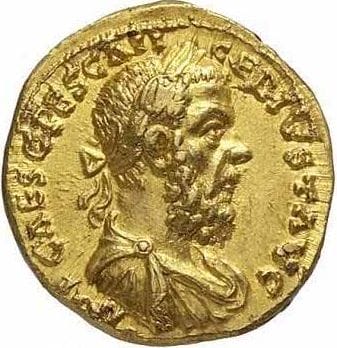Last Updated on December 25, 2021 by Vladimir Vulic
Life: AD 135 – 195

Gaius Pescennius Niger was born into an Italian equestrian family in about AD 135. Made a senator by Commodus, he campaigned against the Sarmatians in Dacia in AD 183, alongside Clodius Albinus. He performed well and was rewarded with the consulship.
In AD 190 he was made governor of Syria. A rumour said this was a favour granted him by Narcissus, the wrestler who had strangled Commodus, who enjoyed some influence. But it is more likely to have been the work of the praetorian prefect Laetus, who sought to place reliable allies into key positions before attempting to get rid of Commodus and to put Pertinax on the throne.
Pescennius Niger was a tall though rather fat man. He possessed a booming voice with which, it is said, could be heard by troops a mile away, if the wind was right. Also he is said to have been a strict man, demanding stern discipline from his troops. He had a great fondness for wine and it is said that he only ever had sex with children.
In April AD 193 news reached Syria that Pertinax had been murdered and that Julianus had bought the throne. Seizing the moment, he had himself proclaimed emperor by his legions – at the very same time as the same was happening in the camp of Septimius Severus.
The entire east, with its nine legions, fell to Niger. And message from the king of Parthia, Vologeses V, showed that Niger would have the support of the Parthians.
There is some thoguht that if Niger would have acted immediately, he might have been triumphant in his bid for overall control. But instead he delayed. Once he made his move, Severus had already reached Rome.Soon after Severus started out for the east with his army.
Niger occupied Byzantium, securing this important bridgehead into Europe. But Severus moved into Thrace and from there set across to Asia Minor (Turkey).
After an initial setback at Cyzicus in late AD 193, Niger retreated, but was decisively beaten at Nicaea early in AD 194.
With the remainder of his army he retreated across the Taurus mountains to Antioch, only to soon learn that Egypt had revolted against him and had switched sides to Severus.
Had his soldiers tried to secure the mountain passes of the Taurus mountains against the advancing foe, they failed. Severus’ armies forced their way through the mountains and now threatened Niger’s capital Antioch.
Niger marched north to meet the foe but was beaten again at Issus in April AD 194.
Fleeing, Niger reached Antioch to issue the command to evacuate the city in light of the arrival of Severus’ troops, before he took flight towards Parthia. But before he could reach the river Euphrates he was caught up with by his pursuers. He was killed, and his severed head was carried to Severus.

Historian Franco Cavazzi dedicated hundreds of hours of his life to creating this website, roman-empire.net as a trove of educational material on this fascinating period of history. His work has been cited in a number of textbooks on the Roman Empire and mentioned on numerous publications such as the New York Times, PBS, The Guardian, and many more.
